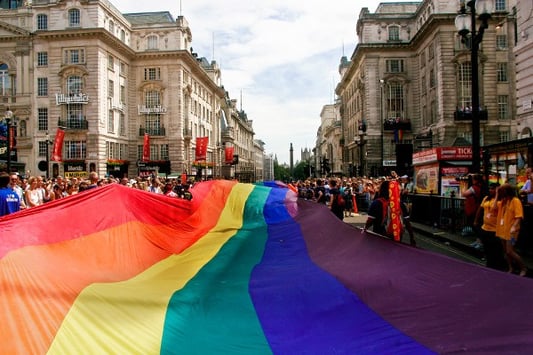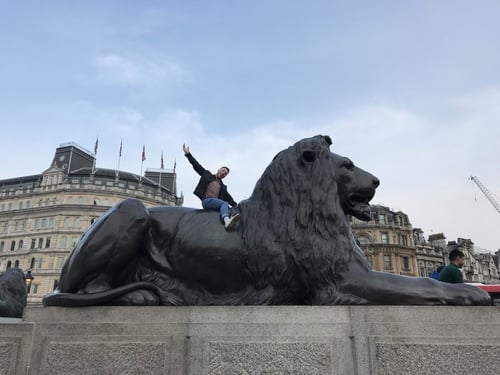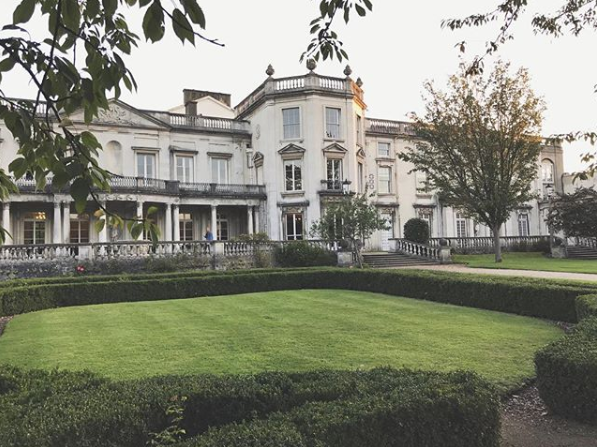This September I embarked on a journey to study abroad in London, England for a full year. Although I tried to prepare myself for what this adventure would be like, I quickly realised that a global city like London was going to expose me to a whirlwind of new things. Growing up in Shelby Township, Michigan I was not exposed to many spaces that existed only for queer people, so I was excited to enter a place where I knew there would be a much more established LGBTQ+ community of people to talk to and connect with. In order to create a full experience in this new world, I inserted myself into many different spaces including my university’s LGBTQ+ Society, working at a gay bar, and connecting with queer dancers in London. Now that I have been exposed to a large LGBTQ+ community, I recognise the positive and exciting things that are happening, but I have also seen the many problematic issues happening that I feel will hinder the progress and unity of queer people if they continue.
I knew before I left for London that the community service project I would be completing through Point Foundation would be to reform the LGBTQ+ Society at the university I was attending. I could see by the lack of social media and information about the organisation that the society did not have a big presence on campus. What I was surprised to learn was that there was a large group of students who were actually “members” of the society, but only about 3-5 of them would actually show up to meetings. What I felt was an even bigger issue was the content of the meetings that were being held. Most of these sessions included drinks at the campus bar, movie nights, or parties. It didn’t feel like there was actually a lot of room being made for conversation between the members of the society.

My main focus while I was at the university was to create that comfortable space to discuss personal issues, struggles, and experiences that the students could share and connect with each other about; I called this time a “conversation corner.” The first session we had was focused on the different stereotypes that have been formed about LGBTQ+ people. At first, most of the members were quiet and didn’t speak up, but once someone broke the ice, people started talking and sharing their experiences. I could feel people getting excited and connecting with each other about their shared experiences and I immediately saw a break through in the room. I could see – as was the case in many other queer spaces in London – that once I urged people to get over the uncomfortable hump of “serious” dialogue, it actual brought people closer together.
Working at a gay bar exposed me to a completely different side of the gay world that I had never seen before. On a positive note, in multiple gay bars I saw many advertisements for PrEP, condom distribution, and flyers encouraging gay men to get tested. This type of progressive awareness about sexual health made me feel like there was a lot of growth happening in this area. However, although the gay bar and club scene is mostly about fun, it felt like there was never any type of encouragement to do any activism work for the community. Once again, I saw a very large community of queer people, but a very small amount showing up and mobilizing to help make a difference. It felt like the conversations were always dominated by partying, sex, and relationships. Here is where I saw an extreme need to broaden conversation and act for the community.

Although I admit that I received a filtered view of the LGBTQ+ community, mainly spending time at places that catered towards gay men, I believe it allowed me to fully see the exclusion and lack of recognition for the other members of the LGBTQ+ community. I witnessed gay men express that they did not want any queer women to be around them, I heard highly insensitive jokes about trans people, and felt an overall lack of education on LGBTQ+ issues. This exclusion and occasionally slandering of other members of the community is extremely problematic and I made sure to speak up whenever I heard it happening. However, I think this really highlights the need for discussion and education. From what I witnessed, I think gay men especially need to be more aware of other queer people so that we can lift one another up rather being ignorant and insensitive.
I am not necessarily happy that I witnessed problematic things happening within the LGBTQ+ community in London, but by addressing them and making others aware of their negligence, I realized my own ability to make a difference. I saw that some people may actually be open and ready to have a discussion about “serious” LGBTQ+ matters, but just have not had the opportunities to initiate it; and I truly believe that with more conversation happening, people can become more informed and sensitive to others. Talking with one another is essential for us to continue to grow as a community and lift one another up in order to feel empowered and ready to make a change both within our community and beyond.

This post was written by Point Scholar Michael Arellano.
Michael is currently studying Dance and Behavioral Science at Western Michigan University. While at Western Michigan University, Michael has co-founded Blessings from Broncos, which is a branch of the national nonprofit organization Blessings in a Backpack that works to provide food for underprivileged children. Read more about Michael here.

